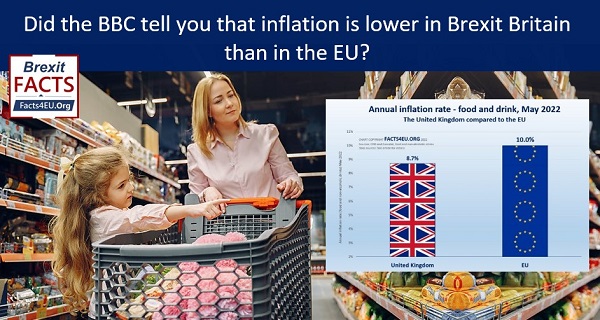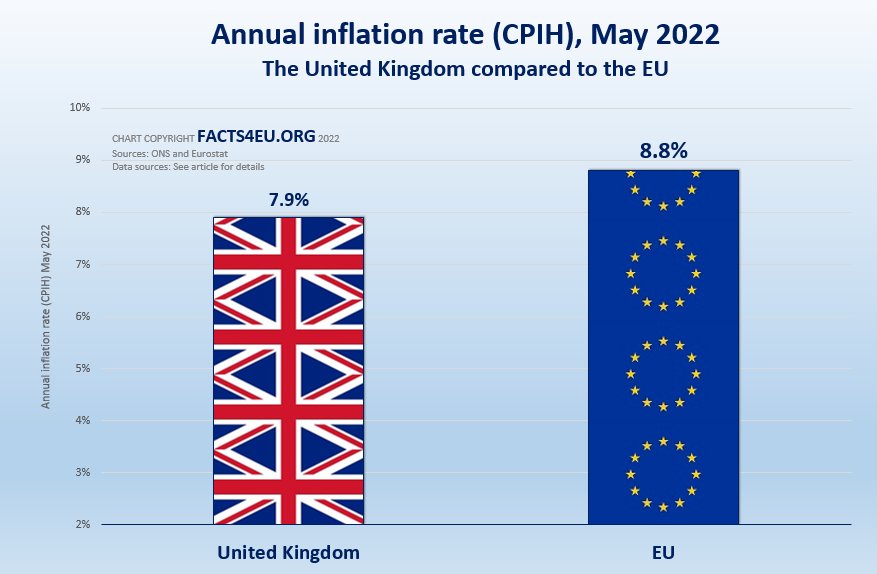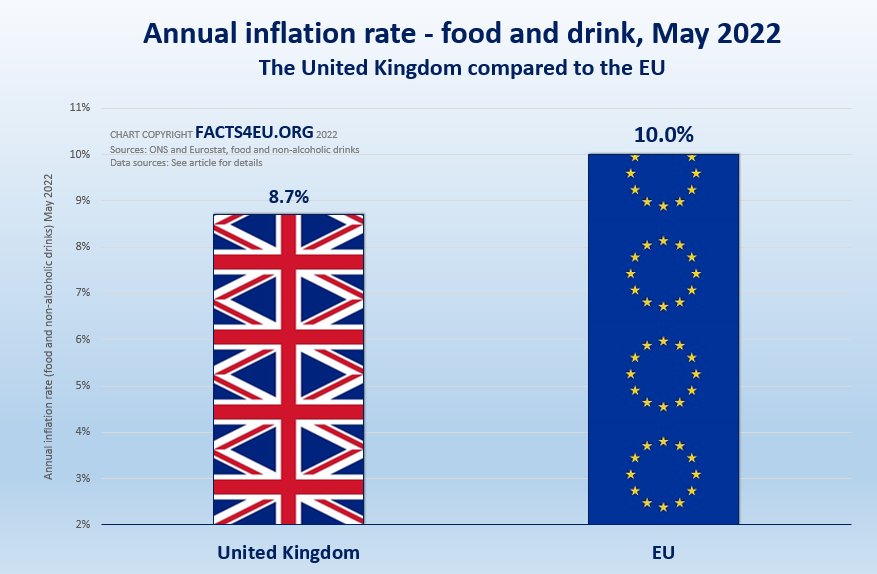Food, glorious food - The EU’s (and BBC’s) cost of living crisis
Inflation – lower in Brexit Britain than in the EU

Montage © Facts4EU.Org 2022
The most commonly used measure of inflation shows that things are worse in the EU
When the latest inflation figures came out on Wednesday (22 June 2022), many of ‘the usual suspects’ were quick to insinuate that Brexit was to blame – at least in part. Those who made international comparisons – such as the BBC – failed to show that the EU has even worse problems.
Facts4EU.Org has analysed the UK’s results and compared them to the picture across the EU. The results are very interesting.
The ONS say: “CPIH is our preferred measure of consumer price inflation” – so that is what we have used.
Brexit Facts4EU.Org Summary
Consumer Prices Index including owner occupiers' housing costs (CPIH)
Annual increase – latest figures released for May 2022
- UK : 7.9%
- EU : 8.8%
© Brexit Facts4EU.Org 2022 - click to enlarge
[Sources: UK Office for National Statistics (ONS) and EU statistics agency (Eurostat).]
How did the BBC cover this story?
On Wednesday the BBC’s coverage of inflation figures focused on the cost of food.

© BBC
Here is their opening paragraph:-
“Prices are continuing to rise at their fastest rate for 40 years with food costs, particularly for bread, cereal and meat, climbing.”
- BBC, 22 June 2022
Whilst the BBC made international comparisons in its report, strangely it did not mention the EU. Facts4EU.Org is therefore happy to put this right for them.
The figures below show one essential element in the rising cost of living: that of food prices, as this was specifically highlighted by the BBC, amongst others.
Brexit Facts4EU.Org Summary
The price of a loaf of bread – and all other food and non-alcoholic drinks
Annual increase – latest figures released for May 2022
- UK : 8.7%
- EU : 10.0%
© Brexit Facts4EU.Org 2022 - click to enlarge
[Sources: UK Office for National Statistics (ONS) and EU statistics agency (Eurostat).]
General explainer - How is inflation measured these days?
There are now three different measures of inflation: Household Cost Indices (HCIs) saw similar inflation rates as the Consumer Prices Index (CPI) and the Consumer Prices Index including owner occupiers' housing costs (CPIH) at the end of 2021, reflecting common drivers of inflation.
All three measures of consumer price inflation have seen sharp rises since March 2021. The last of these - Consumer Prices Index including owner occupiers' housing costs (CPIH) – led the summary in the ONS’s report. It is commonly used in both the UK and in the EU so our main comparison above focuses on this measure.
Observations
If western governments throw debt-fuelled money at their Covid-19 measures on unprecedented levels for two years, it should come as no surprise to anyone that the inflationary pressures would inevitably come home to bite.
When added to the effects on prices of Putin’s illegal invasion of Ukraine - on the costs of energy, grain, fertiliser and sunflower oil - we are now in a perfect storm.
Inflation has become a serious issue for many households across the United Kingdom. That said, if the BBC want to make international comparisons then we might expect them to compare the UK with the EU, as they so often do.
Not on this occasion. And the basic facts in our report above show why.
“Oops, we did it again” (With apologies to Britney Spears)
Things will get worse before they get better, but the simple fact is that once again Brexit Britain is outperforming the European Union.
Talking of the cost of living...
We are a 'not for profit' team (we make a loss) and any donation goes towards the actual work, not plush London offices, lunch or taxi expenses, or other luxuries of some organisations.
We badly need more of our thousands of readers to donate. Could this be you, today? Maybe you've been thinking about it, but just haven't got around to doing it? If so, let us reassure you. It's quick and easy and we use two highly secure payment providers. And we do NOT ask you for further donations if you donate once - we just hope that you keep supporting us. Your donation stays anonymous unless you tell us otherwise.
Please don't assume that other people will keep us going - we don't receive enough to survive and we need your help today. Could you help us?
Most of our readers are well-informed and appreciate our fact-based articles, presented in a way you won't see anywhere else. If you value reports like the one above, please help our work with a donation. We have far more to do in researching, publishing, campaigning and lobbying Parliament than we have in terms of the financial resources to fulfil these tasks. We badly need funding to continue - we rely 100% on public donations from readers like you.
If you believe in a fully-free, independent, and sovereign United Kingdom, please make a donation now. It’s quick, secure, and confidential, and you can use one of the links below or you can use our Donations page here. You will receive a personal, friendly ‘thank you’ from a member of our team within 24 hours. Thank you for reading this.
[ Sources: Office for National Statistics (ONS) | EU Commission statistics agency (Eurostat) ] Politicians and journalists can contact us for details, as ever.
Brexit Facts4EU.Org, Sun 26 June 2022
Click here to go to our news headlines
Please scroll down to COMMENT on the above article.
And don't forget to actually post your message after you have previewed it!
Since before the EU Referendum, Brexit Facts4EU.Org
has been the most prolific researcher and publisher of Brexit facts in the world.
Supported by MPs, MEPs, & other groups, our work has impact.
We think facts matter. Please donate today, so that we can continue to ensure a clean Brexit is finally delivered.
Paypal Users Only - Choose amount first
Quick One-off
Monthly




Something to say about this? Scroll down for reader comments